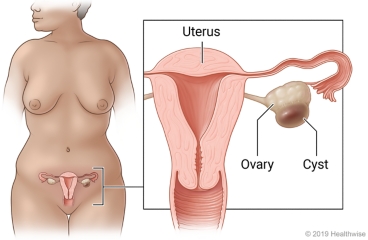Hemorrhagic Ovarian Cyst: Care Instructions

Overview
An ovarian cyst is a sac that forms on the ovary and swells up with fluid. If the cyst bleeds, it is called a hemorrhagic (say "heh-muh-RA-jick") ovarian cyst. If a hemorrhagic cyst breaks open, it can release blood and fluid into the lower belly and pelvis.
You may not have symptoms from the cyst. But if it is large, or if it twists or breaks open, you may have pain or other problems. You may feel pain from the cyst or have symptoms from losing blood.
Your doctor may use a pelvic ultrasound to see if you have a cyst. Blood tests can help your doctor tell if the cyst is bleeding or you have lost a lot of blood.
Treatment depends on your symptoms. If they are mild, your doctor may suggest carefully watching your symptoms and doing blood tests again. But if you have a cyst that is very large, bleeds a lot, or causes other problems, your doctor may suggest surgery to control the bleeding or to remove the cyst. If the bleeding is heavy, you may also need treatment to replace the blood.
Follow-up care is a key part of your treatment and safety. Be sure to make and go to all appointments, and call your doctor or nurse advice line (811 in most provinces and territories) if you are having problems. It's also a good idea to know your test results and keep a list of the medicines you take.
How can you care for yourself at home?
- Use heat, such as a warm water bottle, a heating pad set on low, or a warm bath, to relax tense muscles and relieve cramping.
- Be safe with medicines. Read and follow all instructions on the label.
- If the doctor gave you a prescription medicine for pain, take it as prescribed.
- If you are not taking a prescription pain medicine, ask your doctor if you can take an over-the-counter medicine.
When should you call for help?
Call 911 anytime you think you may need emergency care. For example, call if:
- You passed out (lost consciousness).
Call your doctor or nurse advice line now or seek immediate medical care if:
- You have severe vaginal bleeding.
- You are dizzy or light-headed, or you feel like you may faint.
- You have new or worse pain in your belly or pelvis.
Watch closely for changes in your health, and be sure to contact your doctor or nurse advice line if:
- You think you may be pregnant.
- You do not get better as expected.
Adaptation Date: 03/02/2022
Adapted By: Alberta Health Services
Adaptation Reviewed By: Alberta Health Services
